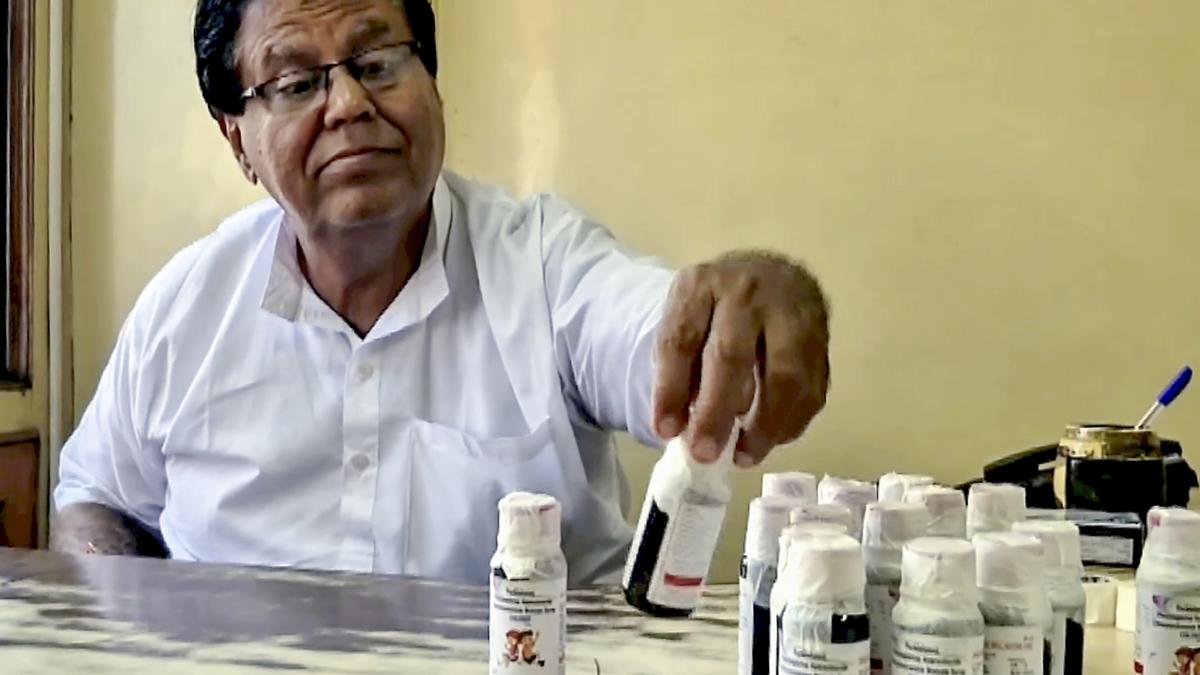Science
Health Ministry Launches Inspections After Cough Syrup Contamination

The Union Health Ministry of India has begun risk-based inspections at the manufacturing facilities of 19 pharmaceutical products across six states. This decision follows alarming findings by the Tamil Nadu Food Safety and Drug Administration (FDA), which detected samples of Coldrif cough syrup containing diethylene glycol (DEG) above permissible limits. The inspections come in the wake of ongoing investigations into the deaths of at least 10 children, reportedly linked to the consumption of cough syrups in Madhya Pradesh and Rajasthan.
In a statement issued on October 4, 2025, the Health Ministry emphasized that these inspections aim to identify gaps in quality control processes and propose improvements to prevent future incidents. Following a request from the Madhya Pradesh government, Tamil Nadu’s FDA took samples of Coldrif cough syrup from the manufacturing premises of Sresan Pharma in Kanchipuram. The testing confirmed the presence of DEG beyond acceptable limits.
As part of the ongoing investigation, the Central Drugs Standard Control Organisation (CDSCO) collected six samples from various manufacturers. Testing revealed that all samples were free from both DEG and ethylene glycol (EG). Simultaneously, the Madhya Pradesh FDA reported that out of 13 samples collected, three were analyzed and found to be free of DEG and EG.
Multidisciplinary Team Investigates Child Deaths
A multidisciplinary team of experts, including members from the National Institute of Virology, the Indian Council of Medical Research, the National Environmental Engineering Research Institute, the CDSCO, and the All India Institute of Medical Sciences in Nagpur, is conducting a thorough analysis of the various samples. Their focus is on understanding the causes of death in and around Chhindwara, Madhya Pradesh.
DEG and EG are industrial solvents commonly found in antifreeze, paints, brake fluids, and plastics. Poor regulatory oversight or the use of cheaper, industrial-grade materials can lead to their contamination in pharmaceutical products, such as glycerine. The World Health Organization (WHO) has issued six global alerts since October 2022 regarding over-the-counter medicines contaminated with DEG and EG. The first reports of substandard medical products originated in The Gambia, with subsequent cases appearing in the WHO regions of Southeast Asia, Europe, the Western Pacific, and the Eastern Mediterranean. It is estimated that at least 300 children have died worldwide due to these contaminated products.
The Coldrif syrup has also been sampled for analysis by Madhya Pradesh’s Drug Regulatory Authority, with results still pending. The six drug samples tested by CDSCO, which showed no presence of DEG or EG, included various other medications such as antibiotics, antipyretics, and ondansetron, which were consumed by children who fell ill in Chhindwara district.
The Health Ministry’s proactive approach underscores the urgency of addressing potential risks associated with pharmaceutical manufacturing in India, as families seek answers and accountability in the wake of these tragedies.
-

 World5 months ago
World5 months agoSBI Announces QIP Floor Price at ₹811.05 Per Share
-

 Lifestyle5 months ago
Lifestyle5 months agoCept Unveils ₹3.1 Crore Urban Mobility Plan for Sustainable Growth
-

 Science4 months ago
Science4 months agoNew Blood Group Discovered in South Indian Woman at Rotary Centre
-

 World5 months ago
World5 months agoTorrential Rains Cause Flash Flooding in New York and New Jersey
-

 Top Stories5 months ago
Top Stories5 months agoKonkani Cultural Organisation to Host Pearl Jubilee in Abu Dhabi
-

 Sports4 months ago
Sports4 months agoBroad Advocates for Bowling Change Ahead of Final Test Against India
-

 Science5 months ago
Science5 months agoNothing Headphone 1 Review: A Bold Contender in Audio Design
-

 Top Stories5 months ago
Top Stories5 months agoAir India Crash Investigation Highlights Boeing Fuel Switch Concerns
-

 Business5 months ago
Business5 months agoIndian Stock Market Rebounds: Sensex and Nifty Rise After Four-Day Decline
-

 Sports4 months ago
Sports4 months agoCristian Totti Retires at 19: Pressure of Fame Takes Toll
-

 Politics5 months ago
Politics5 months agoAbandoned Doberman Finds New Home After Journey to Prague
-

 Top Stories5 months ago
Top Stories5 months agoPatna Bank Manager Abhishek Varun Found Dead in Well









